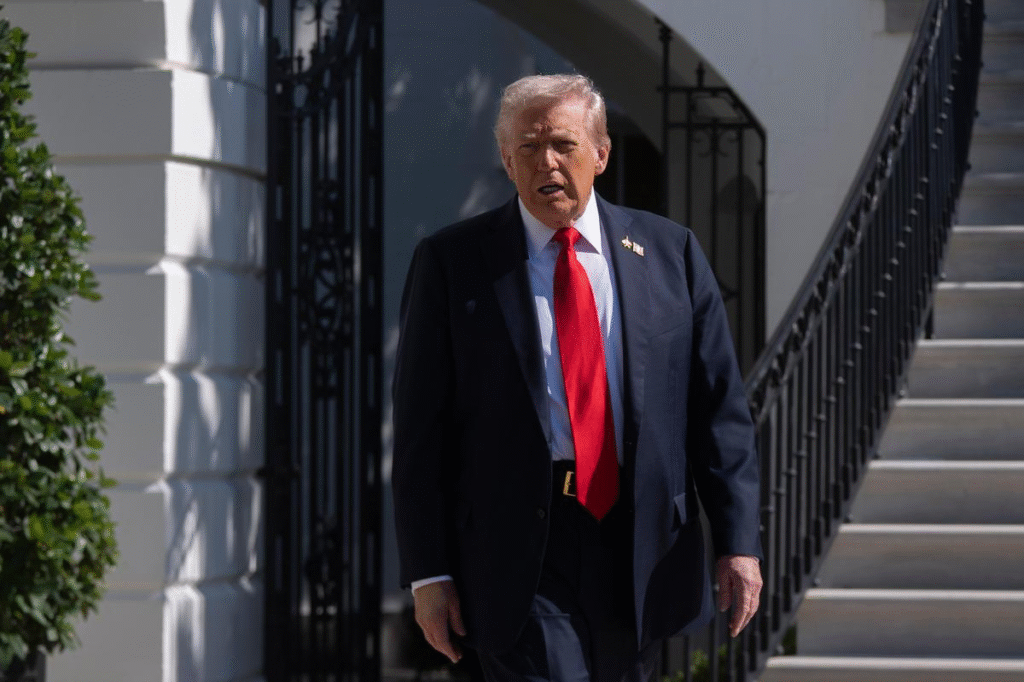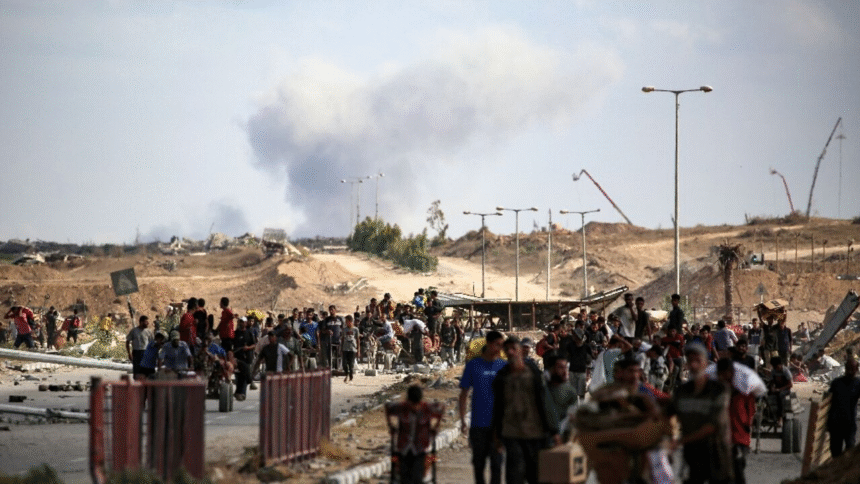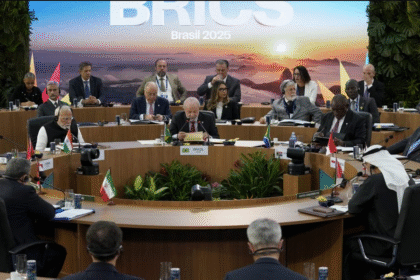Hamas and Israel Open Peace Negotiations in Egypt Under Trump’s Bold Gaza Plan — Hopes Rise for First Ceasefire in 7 Months
In a major diplomatic breakthrough, Hamas and Israel have begun peace talks in Egypt under Donald Trump’s Gaza peace plan, raising hopes for the first ceasefire in 7 months amid ongoing conflict and humanitarian crisis in the region
Delegations from Hamas and Israel on Monday (October 6, 2025) began indirect talks in Egypt on ending the nearly two-year war in Gaza, with U.S. President Donald Trump judging that the Palestinian militant group was ready to compromise over his proposals for a deal.
Al-Qahera News, which is linked to Egyptian state intelligence, said the first round of talks ended “amid a positive atmosphere” and would continue on Tuesday (October 7, 2025).
Behind closed doors and under tight security, negotiators were to speak through mediators shuttling back and forth, only weeks after Israel tried to kill Hamas’s lead negotiators in a strike on Qatar.
Al-Qahera News earlier said delegations were “discussing preparing ground conditions for the release of detainees and prisoners”.

“Egyptian and Qatari mediators are working with both sides to establish a mechanism” for the release of hostages held in Gaza in exchange for Palestinians held in Israeli jails, it said.
Mr. Trump told reporters at the White House he was “pretty sure” a peace deal was possible.
“I think Hamas has been agreeing to things that are very important… I think we’re going to have a deal.”
Hamas’s lead negotiator Khalil al-Hayya, who survived Israel’s attack on the Palestinian Islamist movement’s leaders in Doha last month, held a meeting with Egyptian intelligence officials ahead of the talks, an Egyptian security source said.
This round of negotiations, launched on the eve of the second anniversary of Hamas’s October 7, 2023 attack that sparked the war, “may last for several days”, said a Palestinian source close to Hamas’s leadership.
“We expect the negotiations to be difficult and complex, given the occupation’s intentions to continue its war of extermination,” he told AFP.
Mr. Trump, whose envoy Steve Witkoff and son-in-law Jared Kushner are expected in Egypt, has urged negotiators to “move fast” to end the war in Gaza, where Israeli strikes continued on Monday.
At least seven Palestinians were killed in the latest Israeli air strikes, according to Mahmud Bassal, spokesman for Gaza’s civil defence agency.

AFP footage showed explosions in the Gaza Strip, with plumes of smoke rising over the skyline, even after U.S. Secretary of State Marco Rubio said Israel must stop bombing the territory.
Cairo, October 6 — In what could mark a historic turning point in the Middle East conflict, Hamas and Israel have officially opened peace negotiations in Egypt under the framework of former U.S. President Donald Trump’s Gaza peace plan. The high-stakes dialogue, hosted in Cairo, represents the most significant attempt yet to end more than seven months of bloodshed that has devastated Gaza and strained global diplomacy.
The talks, mediated by Egyptian intelligence officials and backed by U.S. advisors from Trump’s team, aim to reach a comprehensive ceasefire agreement that would halt hostilities, facilitate humanitarian access, and lay the groundwork for a long-term political settlement.
Diplomatic sources confirmed that both delegations arrived in Cairo late Saturday night under tight security. The Israeli team includes senior defense officials and advisors from the Prime Minister’s Office, while the Hamas delegation is led by Ismail Haniyeh and senior political bureau members.
The Egyptian Foreign Ministry described the talks as “constructive” and said all sides had shown “a willingness to explore practical steps toward de-escalation.”
“Egypt remains committed to facilitating dialogue that prioritizes human life and regional stability,” said Foreign Minister Sameh Shoukry during the opening session.
Trump’s re-engagement in the Middle East peace process, despite being out of office, has surprised many observers. His Gaza plan — revised from his 2020 ‘Deal of the Century’ — focuses on creating a demilitarized Gaza corridor, joint Israeli-Palestinian reconstruction projects, and international oversight over border control.

According to reports, Trump’s son-in-law Jared Kushner, architect of the Abraham Accords, has been in close contact with Egyptian and Qatari mediators for weeks. While not officially representing the U.S. government, the former president’s diplomatic network has reactivated to push what he calls a “realistic path to regional peace.”
“Peace is always possible when strength meets reason. The people of Gaza and Israel deserve stability, not endless war. The Cairo talks are a step toward lasting peace.”
Analysts suggest Trump’s involvement could be a strategic bid to bolster his foreign policy credentials ahead of the 2024 U.S. presidential elections, but many acknowledge that his mediation might help break diplomatic gridlocks that formal channels have failed to resolve.
Sources close to the Egyptian delegation revealed that the initial phase of talks will focus on establishing a temporary 72-hour ceasefire, followed by humanitarian access to Gaza, where more than 25,000 people have been killed and 80% of residents displaced since the war began.
The second phase is expected to tackle hostage exchanges and security guarantees for both sides, with international observers possibly overseeing border areas.
“We are cautiously optimistic,” said a senior Egyptian mediator. “Both parties understand that continued fighting serves no one’s interests — not Israel’s security, not Gaza’s survival, not the region’s stability.”
The Israeli government, under mounting domestic and international pressure, has signaled cautious openness to talks but maintains that any agreement must include Hamas’s disarmament and the return of Israeli hostages.
“Our position is clear — Israel will not tolerate any ceasefire that leaves Hamas capable of launching future attacks. Peace must come with security.”
At the same time, several members of Israel’s coalition government have expressed skepticism about engaging with Hamas directly, urging caution over what they call “premature diplomacy.”
Hamas leaders, meanwhile, insist that the talks must prioritize ending Israel’s blockade of Gaza, restoring essential supplies, and allowing free movement for civilians. The group has framed its participation as a gesture of goodwill in response to regional and global appeals for peace.
Hamas political chief Ismail Haniyeh told reporters before entering the Cairo venue,
“The people of Gaza have suffered enough. We are ready to discuss peace if it means freedom, dignity, and reconstruction.”
He further accused Israel of committing “war crimes” and urged international powers to “act with conscience, not convenience.”
Egypt, a long-standing mediator in Israeli-Palestinian conflicts, has once again emerged as the diplomatic epicenter of peace efforts. Cairo’s proximity to Gaza, its intelligence networks, and its balanced relations with both Israel and Palestinian factions make it an indispensable broker.
The Egyptian government has imposed tight media restrictions around the hotel complex hosting the talks. Meanwhile, security forces have cordoned off nearby streets to prevent any demonstrations that could disrupt proceedings.
Diplomatic insiders say the first two rounds of dialogue will be held behind closed doors, with potential joint press briefings expected only if progress is achieved.
The Cairo talks have drawn cautious optimism from across the world. The United Nations, European Union, and Qatar have all welcomed the renewed diplomatic momentum.
UN Secretary-General António Guterres called the negotiations “a critical opportunity to end the cycle of destruction,” urging both sides to “prioritize humanity over hostility.”
In Washington, the Biden administration has taken a neutral stance, saying it “welcomes any initiative that can bring about sustainable calm,” even if led by a former president.
Meanwhile, the Arab League expressed full support for Egypt’s role, with Secretary-General Ahmed Aboul Gheit calling it “a vital step toward de-escalation and long-term regional stability.”
After more than 200 days of continuous violence, Gaza remains on the brink of collapse. The World Health Organization (WHO) reports that hospitals are functioning at less than 20% capacity, while the UNRWA has described the humanitarian crisis as “beyond catastrophic.”
If the Cairo talks fail, observers fear an escalation that could draw in Hezbollah in Lebanon and Iran-backed militias, plunging the Middle East into wider conflict.
However, if successful, the talks could lay the foundation for the first ceasefire since April, opening the door to international aid, reconstruction projects, and possibly a new peace roadmap between Israel and Palestine.
Read Also : Massive Blaze Erupts at Bhiwandi Chemical Godown: 1 Fire Officer Injured in Fierce Firefight







